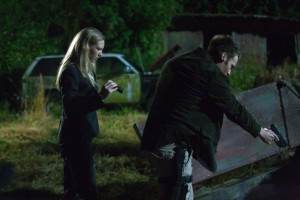 People seem to think that the case-centric episodes of Fringe are weaker than the mytharc episodes, and to a certain extent, that can be true: there’s nothing quite like an episode packed full of Fringe mythos to further the overall story arc. That being said, part of what made ‘One Night in October’so spectacular was the case itself. Never before have I seen a show make use of alternate universes in quite the same way, and I seriously hope we see more in the future. The case served as an enthralling backdrop to showcase not only some of the differences between our characters and their Alternates, but also between the new and old timelines. Not to mention the fact that seeing both Olivias working together on the same case was beyond fascinating.
People seem to think that the case-centric episodes of Fringe are weaker than the mytharc episodes, and to a certain extent, that can be true: there’s nothing quite like an episode packed full of Fringe mythos to further the overall story arc. That being said, part of what made ‘One Night in October’so spectacular was the case itself. Never before have I seen a show make use of alternate universes in quite the same way, and I seriously hope we see more in the future. The case served as an enthralling backdrop to showcase not only some of the differences between our characters and their Alternates, but also between the new and old timelines. Not to mention the fact that seeing both Olivias working together on the same case was beyond fascinating.
One issue that Fringe tackles time and time again is that of ‘nature versus nurture’. Last year I took a forensic psychology course, and one of the central themes was that, for some, a genetic predisposition toward crime plays as big a role as environment in shaping the behaviour of the subject.  The idea that for John McClennan — brilliantly portrayed by guest-star John Pyper-Ferguson — all it took to prevent him from becoming a serial killer was an encounter with a woman who loved him as a child is endlessly intriguing. And I have to admit that I agree with Broyles: there are some people who leave an indelible mark on us, affecting who we are and who we become. Even as the memories fade, the impression they left behind continues to last. The obvious parallel here is that Peter is one such person for Olivia and Walter — even though they don’t have the memories, something of what he means to them remains.
The idea that for John McClennan — brilliantly portrayed by guest-star John Pyper-Ferguson — all it took to prevent him from becoming a serial killer was an encounter with a woman who loved him as a child is endlessly intriguing. And I have to admit that I agree with Broyles: there are some people who leave an indelible mark on us, affecting who we are and who we become. Even as the memories fade, the impression they left behind continues to last. The obvious parallel here is that Peter is one such person for Olivia and Walter — even though they don’t have the memories, something of what he means to them remains.
My one problem with the episode was one I also had with the episode ‘Olivia’: memories aren’t something that can simply be siphoned off and transferred to another. I much prefer the notion that in order to share a memory, the subjects’neural activity must be synchronized with electrodes in order to bring the brains into a similar state of consciousness. (And if you’re curious as to why this might not be as far-fetched as you would think, I’m more than happy to explain elsewhere.) Although, the fact that I’m quibbling about the details of admittedly fringe science should tell you how much I enjoyed this episode!
One of my favourite aspects of the dual universes is seeing the juxtapositions of ‘our’characters with their Alternates. AltLivia seems to be, in this new timeline, back to who she was when we first met her, even after impersonating Olivia. I assume that this is because she never really had to question her loyalties, or Walternate’s motives, without Peter and subsequently Henry. I did find  her reaction to Olivia’s revelation about her stepfather quite telling, and it answered a long-standing question of mine: AltLivia was never abused as a child, which certainly explains some of her differences from Olivia. They are fundamentally very similar people, but Olivia has been tempered and broken, in a way, by the events in her life — dating back to when she was only 3 years old. I am, however, curious as to why Peter’s absence meant that Olivia shot and killed her stepfather rather than just wounding him. My guess is that it has something to do with the events of ‘Subject 13’, but how exactly it relates I am unsure.
her reaction to Olivia’s revelation about her stepfather quite telling, and it answered a long-standing question of mine: AltLivia was never abused as a child, which certainly explains some of her differences from Olivia. They are fundamentally very similar people, but Olivia has been tempered and broken, in a way, by the events in her life — dating back to when she was only 3 years old. I am, however, curious as to why Peter’s absence meant that Olivia shot and killed her stepfather rather than just wounding him. My guess is that it has something to do with the events of ‘Subject 13’, but how exactly it relates I am unsure.
Along with the revelation that Olivia killed her stepfather, one of the things which most took me aback was that Colonel Broyles is still alive. From reactions that I’ve seen so far from other fans, this was also something that caused a great deal of confusion. I think people forget that we are in a new timeline, and there are bound to be some differences, the extent of which we haven’t yet seen. Not to mention, some of the changes are likely to be things that don’t necessarily track linearly from the absence of Peter. As with everything, this raises new questions. My main one being: how on earth did Olivia escape if Colonel Broyles didn’t help her? From what Walter said when he told Lincoln that Olivia spent time Over There, he makes it sound like they kidnapped Olivia from this side, rather than her crossing over to them and getting captured. This would certainly make sense, as Livia wouldn’t really have had a reason to cross over without Peter. If that were the case, perhaps Walternate doesn’t know that Olivia has the capability to cross on her own, so he never had cause to experiment on her or to force her to impersonate AltLivia; then, Walternate could have simply returned Olivia, physically unharmed, when AltLivia was done her mission. This is, of course, merely speculation on my part.
 I imagine that we’ll continue to see Walter trying to deal with the fact that he is seeing hallucinations and dealing with his ever-present fear that he is once again losing his grasp on reality. Hopefully next week’s episode will feature more of Walter and Olivia working together, as I’m still fascinated by the dynamic that they’ve developed in the absence of Peter.
I imagine that we’ll continue to see Walter trying to deal with the fact that he is seeing hallucinations and dealing with his ever-present fear that he is once again losing his grasp on reality. Hopefully next week’s episode will feature more of Walter and Olivia working together, as I’m still fascinated by the dynamic that they’ve developed in the absence of Peter.
Last night’s episode of Fringe was a study in contrasts, and I loved it. I’m intrigued to see what else — and who else — will be different in this new timeline, as well as what may start to happen as Peter’s presence becomes more ‘real’. I’m still hoping that Walter isn’t the only one to sense Peter, that Olivia may soon begin to as well: Cortexiphan acts on her perception, and she has proven resistant to memory manipulation in the past. Much as I love the addition of Seth Gabel as a full-time cast member, I’m hoping they don’t draw out Peter’s disappearance too much longer; from the promo of next week’s episode, it seems as though we may start to get some progress on that front soon. A
 Follow Us
Follow Us






Brilliant article. I'm agree with everything you ve analyzed. I think this is one of my favorite Fringe episodes. The idea that maybe in other universe my other me will have a better or worst life than me. It's fascinating. So sad about the low rating, but I think at least it will survive this whole seasson. greetings from Peru.
mauricio